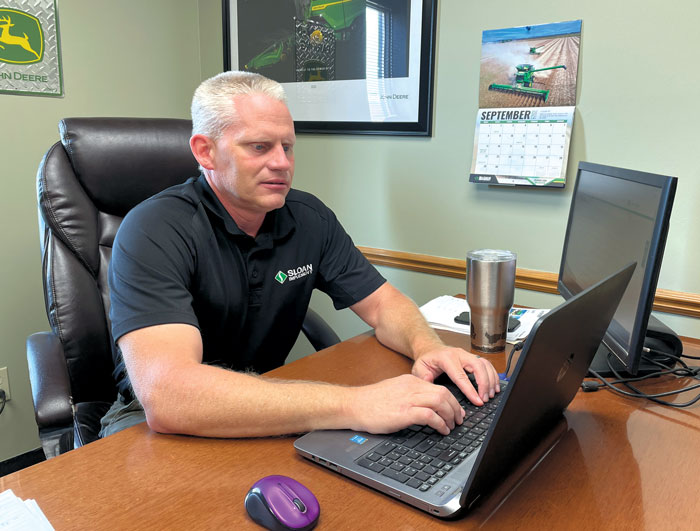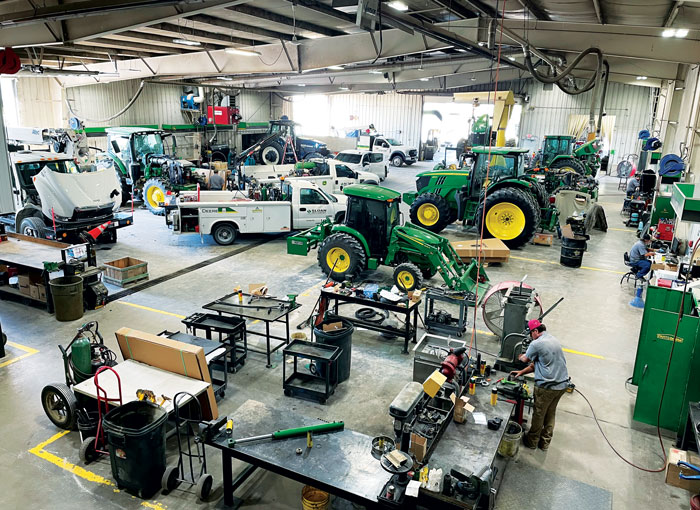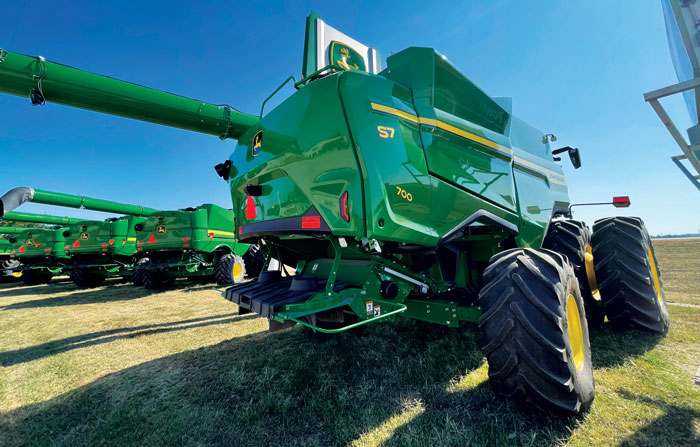It’s almost 10 o’clock on a Thursday morning in early September and salesperson Ryan Seger has barely had a chance to sit down and have a sip of coffee.
“We have a customer in our shop right now who’s got a combine down, so I’ve been talking with him about a possible trade, rental or lease, and looking at different repair quotes,” Seger says. “Before that, I was with another customer who’s been dealing with some intermittent electrical issues on a combine. I went out with our repair technician on that visit this morning. And then we’ve got our Deere field rep coming in here soon to help us with a customer who’s been having all kinds of tire issues.”
There’s a decent amount of showroom floor traffic outside Seger’s office. The buzz is palpable as corn and soybean harvest is already underway for some farmers who planted early in southern Indiana. For others who farm on heavier ground and had to wait out the wettest spring in the region since 2019, harvest season is still a few weeks away.
“We’re helping customers who are already running and also preparing others who are getting ready to run in a couple weeks,” Seger says. “We’re doing repairs and inspections, so it’s very intense right now trying to do both at the same time.”
Alliance Becomes Sloan
The job rarely slows down for Seger, but this summer was even busier than normal at the Vincennes, Ind., dealership formerly known as Alliance Tractor, after it was acquired by 22-store Illinois and Wisconsin John Deere dealer Sloan Implement July 15.
“It’s been a pretty smooth transition so far,” says store manager Jason Boyles, Seger’s next door office neighbor. “It’s a huge benefit to have a lot more stores to pull parts and inventory from. One of the biggest things we’ve noticed is the number of internet calls coming in. I felt like we had a good presence with our website before, but I think Sloan just has so much more of a broad reach that we get a lot more calls from places we probably never have before.”

Salesperson Ryan Seger says it’s been a busy, but rewarding summer after the Vincennes, Ind., store was acquired by Sloan Implement. Learning new software and easing customers’ anxieties about the switch have been two big challenges. Noah Newman
“For us in sales and service, there’s new software that we’re using,” Seger says. “When we sell a piece of equipment, some of the documentation process has changed, so it’s taking a little bit of time getting used to that, but it’s not too complex. There were people from Sloan stopping in and checking with us almost every day for 3 weeks to help with the transition.”
Sloan sent an army of service, parts and sales managers from other stores down to the Vincennes, Ind., location the first week after the acquisition to get everyone on the same page and go over new protocols. Seger says it felt like starting a brand-new job but with the same co-workers. They also hosted a heavily attended combine clinic in August, which introduced customers to some new faces and reassured them that the reliable customer service they know and love isn’t going anywhere despite the name change.
“Oh gosh, for about 3 weeks, all I did was talk to customers. There were a lot of misconceptions out there…”
“There were around 25 people from other Sloan stores here to help put on the combine clinic, and it was awesome because it just showed customers how much support we have from all the other stores,” Boyles says.
“Owner Tom Sloan was also here for the clinic,” Seger says. “He kicked everything off by talking about Sloan’s philosophy and how they always put the customer first. It was wonderful that he took the time to come down here and meet with the customers.”
New Name, Same Service
Seger did his best to shield customers from everything going on behind the curtain as the acquisition was happening, which required daily phone calls and texts to clear up any misconceptions floating around.
“Oh gosh, for about 3 weeks, all I did was talk to customers,” Seger says. “There were a lot of misconceptions out there. Somebody would say, ‘Well, I heard you’re not going to give us anything on our trade-ins,’ and things like that. And I’d say, ‘Well, who’d you hear that from?’ They’d tell me they heard it from another dealer. Some customers worked with other dealers in the past that had gone through acquisitions, and maybe things didn’t go as smoothly as they liked. So, they’d say, ‘We’ve heard this story before.’ I just told them, ‘Fair enough, let’s stay in contact. Let’s see how things go and continue to have these conversations.’ Anytime there’s uncertainty, there’s anxiety.”
Seger and Boyles quickly eased concerns by letting people know their favorite technicians and key contacts at the store were staying on board. They also informed customers of the positives that come with being acquired by a 22-store dealer.

The service department has its hands full with repairs and inspections as harvest season ramps up in the southwestern part of Indiana. Noah Newman
“Going from 4 stores to 26 stores, that’s going to help us a lot with parts,” Seger says. “We’re going to have a lot more used equipment available to customers.”
“Another big thing we’re going to have that we’ve never had before is a call center for technical support,” Boyles says. “If you’re in the cab during harvest, and you’re having an issue, you can call our technical support number and get an answer quickly. We’ve been putting stickers with the number on everybody’s equipment or window to try to promote it as much as possible, so they know it’s there to use.”
“There were around 25 people from other Sloan stores here to help put on the combine clinic, and it was awesome because it just showed customers how much support we have from all the other stores…”
While most of the staff has remained the same, one big change was the promotion of longtime technician Jeremy Adams to service manager. Adams has his hands full in the shop, working furiously to get equipment ready for harvest, so we’re unable to catch up with him during this visit. But Seger says there’s been a lot of communication between Adams and the sales department to make sure there aren’t any hiccups with customers having to wait on service or getting overlooked after the acquisition.
“Jeremy was a shop supervisor and technician before, so it was a fairly easy transition,” Seger says. “He’s a good people person and our customers have known him for years.”
Challenges Ahead
The transition from Alliance to Sloan would’ve been much more challenging for the sales team if it happened last summer when there was a stronger demand for equipment, Seger says. Equipment sales have been relatively slow this summer due to a significant drop in commodity prices, which they anticipated. It’s a challenge that doesn’t seem to be going away anytime soon, but they have a plan in place to deal with it.
“We’re looking at high amounts of used inventory, which is going to be our biggest challenge for 2025 by far,” Boyles says. “We’re getting really aggressive on rates. We’ve been using funds that we set aside when we sell new equipment to buy interest rates down on our used stuff. We’ve been holding about a 3.9% fixed on our used equipment. We’d been doing that with planters, tillage tools and some vertical tillage tools. The new stuff is about 6.5% and that’s been steady here for the last few months. It’s not a great, but it could be worse.
“We have even done a few 2.9% on some planters and sprayers to help get some of those moved. And that was another factor in moving a few of those planters and sprayers — throwing out a 2.9% fixed for 5 years, which is largely an unheard-of rate right now in the market.”
With farmers having tighter budgets, Seger says the sales team will have to be more aggressive than they have been in the past.
“For a while, it was hard to actually get out of the office because we were processing so many orders,” Seger says. “But now, with the slowdown, we’re going to have to be more proactive with customers and working with them directly at their farms. We’ll be on the road a lot more.”
Behind the Scenes at Sloan Implement
Check out video interviews with salesperson Ryan Seger and store manager Jason Boyles on Farm-Equipment.com/1024:
“The nice thing about now having 26 stores and more salespeople is if each of us would just sell 1 combine, that would reduce our inventory tremendously,” Boyles says. “That’s our goal right now — pick your customer, find a home for a few pieces of equipment and get them moved.”
Staying Ahead of the Curve
It’s hard not to spot one of the newest pieces of equipment on display in front of the store — a limited production S7 combine that they’ve been demoing for wheat growers this summer.
“The results from customers were positive,” Seger says. “Instead of being reactive, this combine is proactive. It uses satellite imagery and cameras to speed up and slow down the combine based on crop conditions.”
By demoing the new combine, Seger hopes to also identify customers that might be in the market for technology upgrades.
“Even if the customer doesn’t buy this new combine, there might be some technology on the machine they’re interested in,” Seger says. “They can upgrade their current combine with something like the cross-auger shutoff and adjustable spout.

Sloan Implement demoed this limited production S7 combine with automation for wheat growers during the summer. Noah Newman
“This kind of technology is here to stay, and it’s here for a reason because not only does it allow the customer to be more productive, but it also helps their bottom line. With these commodity prices, we want to do everything we can to help the customer be more productive and efficient.”
The store was also planning to demo John Deere See & Spray in the spring, as reported in part 2 of the Boots on the Ground series. Those plans didn’t quite materialize due to the chaotic nature of the wet planting season. Seger says they’ll give it another shot next spring.
“We struggled with that because with the wet weather, we had so many farmers that were still trying to get their first crops out. They’re trying to plant double crop wheat, spraying corn and beans, sidedressing corn. All this stuff was happening at the same time, so it was just really hectic. We were busy, and had so much going on, that it was hard for us to get the See & Spray out there and demo it like we hoped to.”
“We’re looking at high amounts of used inventory, which is going to be our biggest challenge for 2025 by far…”
As precision technology becomes more widespread, it’s more important than ever to have a team of skilled precision specialists and technicians in place, Seger says. Many dealerships are struggling to find qualified people, but Sloan Implement is having success tapping into the local Vincennes Univ. pipeline.
“They’ve got a John Deere tech center,” Seger says. “We recently hired 2 technicians who came from that program and interned with us. It’s hard to find people nowadays that have skill. We’re getting young people through the school that are doing a great job. Having skilled technicians also makes it easier to sell equipment. It would be hard for me to go out and sell an expensive combine and say, ‘Here, buy this, but good luck getting it serviced.’”
As we wrap up our visit with Seger, he expresses his excitement for harvest season. He sold 8 combines last year and seeing them running in the field this fall is one of the most rewarding parts of his job.
“I went out and rode with a customer last evening,” Seger says. “He was in one combine and his son was in another. It was really neat. His son, wife and his 2-year-old grandson rode with him. Seeing how excited the grandson was to ride with his dad, even though everything’s really busy this time of year, those neat little moments feel really rewarding.”
Farm Equipment's Boots on the Ground series is brought to you by Yetter Farm Equipment.
Yetter Farm Equipment has been providing farmers with residue management, fertilizer placement, and seedbed preparation solutions since 1930. Today, Yetter equipment is your answer for success in the face of ever-changing production agriculture challenges. Yetter offers a full lineup of planter attachments designed to perform in varying planting conditions, multiple options for precision fertilizer placement, strip-till units, and stalk rollers for your combine. Yetter products maximize your inputs, save you time, and deliver return on your investment. Visit them at yetterco.com.








